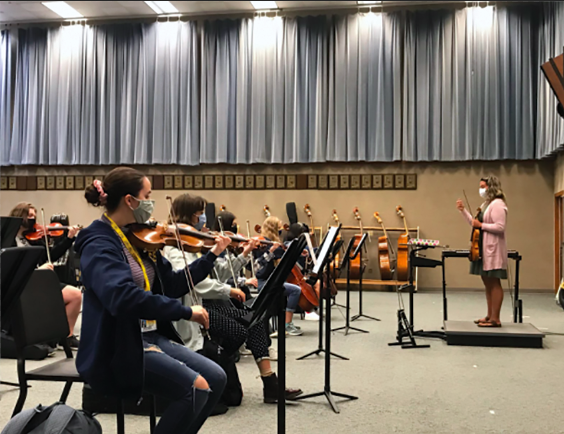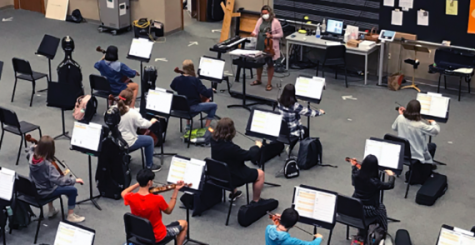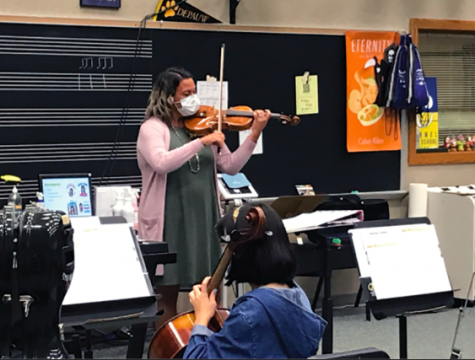
Where are you from?
“So originally, I grew up in Rochester Mich. and then I did my bachelor’s of music (degree) in violin performance at Butler University, where I went to Eastman School of Music to do my graduate work, and I got a masters in music and then also an orchestral studies diploma. And then I wanted to teach, as well, so I came back to Butler and got certified and licensed. My first teaching job was in Hamilton Southeastern Schools. I taught at Brooks School Elementary for three years teaching general music and choir, and then switched over to orchestra at the high school, at Fishers High School, and then taught there for 13 years, taught the orchestra, and then came here.”
How are you adjusting to CHS?
“I love it. It’s great. The kids are wonderful. I love my colleagues, they’re fantastic to work with, and so far, so great.”
Have you enjoyed your time at Carmel so far?
“Yeah, absolutely.”
What is your favorite part of Carmel that is unique from other schools?
“I would say, I guess, that there’s just such a sense of togetherness and really the caring that happens, you know, between the students and the teachers, and then vice-versa, like other ways around from the teachers to the students and students to teachers. It’s been really nice.”
What are you looking forward to at CHS?
“Again, I think just getting to know the kids and working with the kids and getting to kind of do some different things, and obviously this is such a weird year with things. I’m looking forward to, I guess, when things are more normal, getting to see the kids every other day versus every four days.”
What are some differences between your old school and CHS?
“Well, just something that’s been different for me is block scheduling. I’ve never been on a block schedule before. So there are really great things to that, obviously. Again, in this weird year, it’s not ideal just not seeing the kids every but four days. So, yeah, there are a lot of similarities also to the schools that I’ve been at, as well.”
How has COVID-19 changed or affected your teaching?
“I would say, just because of the lack of time we’ve had to stray from the traditional setting and come up with some different things to, obviously, do orchestra online. So, it’s just made us have to think outside of the box and come up with some different things that we normally wouldn’t do or maybe normally wouldn’t have time to do. So it’s not necessarily that the changes are negative, it’s also a positive, too. It makes students more, it gives them the opportunity to be a little bit more well rounded.”

What precautions have you made it a personal priority to implement for health and safety during the epidemic?
“The ones that we think are most important, we’ve implemented. And so we have the students distance at six feet all the time., Wwe’re all sitting facing the same direction, which is completely different than how a traditional orchestra sits. We spray the stands and the chairs are disinfected after every use. And we’re taking precautions also, like instead of helping tune as much, we are really not doing that as much,; and that also I guess places some responsibility, more responsibility on the student, as well, to tune their instruments on their own.”
Has COVID-19 made your transition to CHS harder?
“It absolutely has. Again for what we teach, it’s just different to be sitting in those rows and not have some of the experiences that we’re used to, like concerts and some of the after school or extracurricular things that we’re normally used to doing, that do bring us closer together and help us bond a little bit more. So it’s been difficult but, we’re still doing the stuff, just in a different way, I guess.”
What topics do you cover for orchestra students on virtual days?
“We have done kind of a myriad of things, from guided practice to doing some music theory, music history, that type of thing that we, again, normally don’t have a ton of time to cover in class because it’s a performance-based class, so we’re working on that aspect. So, virtual days are for continuing that, and then adding some other things like I just mentioned.”
Have you ever taught virtually before you came to CHS?
“I did, because I was at Fishers when the pandemic started, and so we went all virtual. And so, yes, I’ve taught virtually before coming here.”
How does Carmel’s virtual education differ from your past experience?
“Obviously, the main differences. When I started here, we were hybrid. So, we had those days in class with the kids, versus at Fishers where it was just all virtual, and not with the kids any, any longer, so it was an everyday type of thing versus an every-other-day type of thing.”
How does Carmel’s orchestra program differ from your past school or other high school’s orchestras?
“They are fantastic. The teaching that happens here, and just the tradition of excellence that has been set is just second to none, and they are for sure one of the best orchestra programs in the country. For sure.”
Are you excited to continue working with CHS orchestra students?
“Of course. It’s just so exciting. The kids that are in orchestra, they’re ready to go, they want to learn, they want to be successful. And I’m looking forward to helping them get there.”
































![What happened to theater etiquette? [opinion]](https://hilite.org/wp-content/uploads/2025/04/Entertainment-Perspective-Cover-1200x471.jpg)













































![Review: “The Immortal Soul Salvage Yard:” A criminally underrated poetry collection [MUSE]](https://hilite.org/wp-content/uploads/2025/03/71cju6TvqmL._AC_UF10001000_QL80_.jpg)
![Review: "Dog Man" is Unapologetically Chaotic [MUSE]](https://hilite.org/wp-content/uploads/2025/03/dogman-1200x700.jpg)
![Review: "Ne Zha 2": The WeChat family reunion I didn’t know I needed [MUSE]](https://hilite.org/wp-content/uploads/2025/03/unnamed-4.png)
![Review in Print: Maripaz Villar brings a delightfully unique style to the world of WEBTOON [MUSE]](https://hilite.org/wp-content/uploads/2023/12/maripazcover-1200x960.jpg)
![Review: “The Sword of Kaigen” is a masterpiece [MUSE]](https://hilite.org/wp-content/uploads/2023/11/Screenshot-2023-11-26-201051.png)
![Review: Gateron Oil Kings, great linear switches, okay price [MUSE]](https://hilite.org/wp-content/uploads/2023/11/Screenshot-2023-11-26-200553.png)
![Review: “A Haunting in Venice” is a significant improvement from other Agatha Christie adaptations [MUSE]](https://hilite.org/wp-content/uploads/2023/11/e7ee2938a6d422669771bce6d8088521.jpg)
![Review: A Thanksgiving story from elementary school, still just as interesting [MUSE]](https://hilite.org/wp-content/uploads/2023/11/Screenshot-2023-11-26-195514-987x1200.png)
![Review: "When I Fly Towards You", cute, uplifting youth drama [MUSE]](https://hilite.org/wp-content/uploads/2023/09/When-I-Fly-Towards-You-Chinese-drama.png)
![Postcards from Muse: Hawaii Travel Diary [MUSE]](https://hilite.org/wp-content/uploads/2023/09/My-project-1-1200x1200.jpg)
![Review: "Ladybug & Cat Noir: The Movie," departure from original show [MUSE]](https://hilite.org/wp-content/uploads/2023/09/Ladybug__Cat_Noir_-_The_Movie_poster.jpg)
![Review in Print: "Hidden Love" is the cute, uplifting drama everyone needs [MUSE]](https://hilite.org/wp-content/uploads/2023/09/hiddenlovecover-e1693597208225-1030x1200.png)
![Review in Print: "Heartstopper" is the heartwarming queer romance we all need [MUSE]](https://hilite.org/wp-content/uploads/2023/08/museheartstoppercover-1200x654.png)


